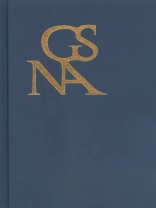Cutting-edge scholarly articles on diverse aspects of Goethe and the Goethezeit, featuring in this volume a special section on environmentalism.
The
Goethe Yearbook is a publication of the Goethe Society of North America, encouraging North American Goethe scholarship by publishing original English-language contributions to the understanding of Goethe and other authors of the
Goethezeit while also welcoming contributions from scholars around the world.
Volume 22 features a special section on environmentalism, edited by Dalia Nassar and Luke Fischer, with contributions on: the metaphor of music in Goethe’s scientific work and its influence on Deleuze, Merleau-Ponty, Uexküll, and Zuckerkandl (Frederick Amrine); his conceptualization of modern civilization in
Faust (Gernot Böhme); a non-anthropocentricvision of nature in his writings on the intermaxillary bone (Ryan Feigenbaum); his geopoetics of granite (Jason Groves); the historical antecedents of biosemiotics in ‘Die Metamorphose der Pflanzen’ (Kate Rigby); and the conceptof the ‘Dark Pastoral’ in
Werther (Heather I. Sullivan).
In addition, there are articles on Goethe as a spiritual predecessor of phenomenology (Iris Hennigfeld); concepts of the ‘hermaphrodite’ in contributions to the
Encyclopédie by Louis de Jaucourt and Albrecht von Haller (Stephanie Hilger); on Goethe’s poem ‘Nähe des Geliebten’ (David Hill); on the link between commerce and culture in
West-östlicher Divan (Daniel Purdy); on Goethe’s thoughts on collecting and museums (Helmut Schneider); and on intrigues in the works of J. M. R. Lenz (Inge Stephan).
Contributors: Frederick Amrine, Gernot Böhme, Ryan Feigenbaum, Luke Fischer, Jason Groves, Iris Hennigfeld, Stephanie M. Hilger, David Hill, Dalia Nassar, Daniel Purdy, Kate Rigby, Helmut J. Schneider, Inge Stephan, Heather I. Sullivan.
Adrian Daub is Associate Professor of German at Stanford. Elisabeth Krimmeris Professor of German at the University of California Davis. Book review editor Birgit Tautz is Associate Professor of German at Bowdoin College.
Inhoudsopgave
Introduction to the Special Section on Goethe and Environmentalism
Art, Nature, and the Poesy of Plants in the
Goethezeit: A Biosemiotic Perspective
The Music of the Organism: Uexküll, Merleau-Ponty, Zuckerkandl, and Deleuze as Goethean Ecologists in Search of a New Paradigm
Toward a Nonanthropocentric Vision of Nature: Goethe’s Discovery of the Intermaxillary Bone
Goethe’s Petrofiction: Reading the
Wanderjahre in the Anthropocene
Nature and the ‘Dark Pastoral’ in Goethe’s
Werther
Goethe und die moderne Zivilisation
Goethe’s Phenomenological Way of Thinking and the
Urphänomen
Orientation and Supplementation: Locating the ‘Hermaphrodite’ in the
Encyclopédie
Claudine von Villa Bella and the Publication of ‘Nähe des Geliebten’
West-östliche Divan and the ‘Abduction/Seduction of Europe’: World Literature and the Circulation of Culture
Kunstsammlung und Kunstgeselligkeit: Zu Goethes Sammlungs- und Museumskonzeption zwischen 1798 und 1817
‘Er hatte einen entschiedenen Hang zur Intrige’: Überlegungen zu J. M. R. Lenz, seiner Rezeption und seinen Werken
Review Essay: Goethe’s Writings as a Minister of State in Saxe-Weimar and Eisenach
Book Reviews
Over de auteur
ELISABETH KRIMMER is Professor of German at the University of California, Davis.












